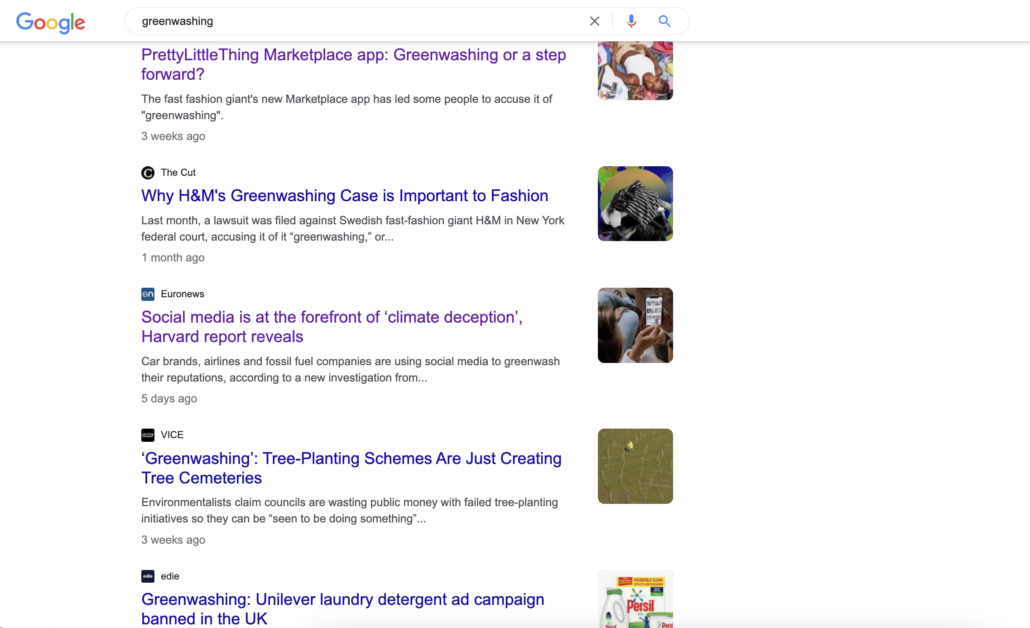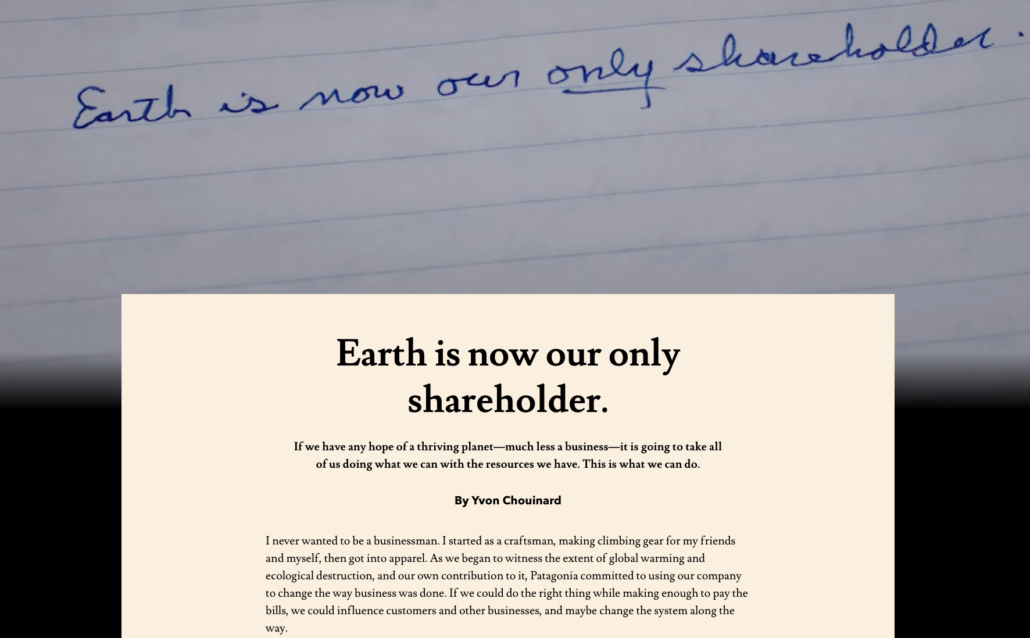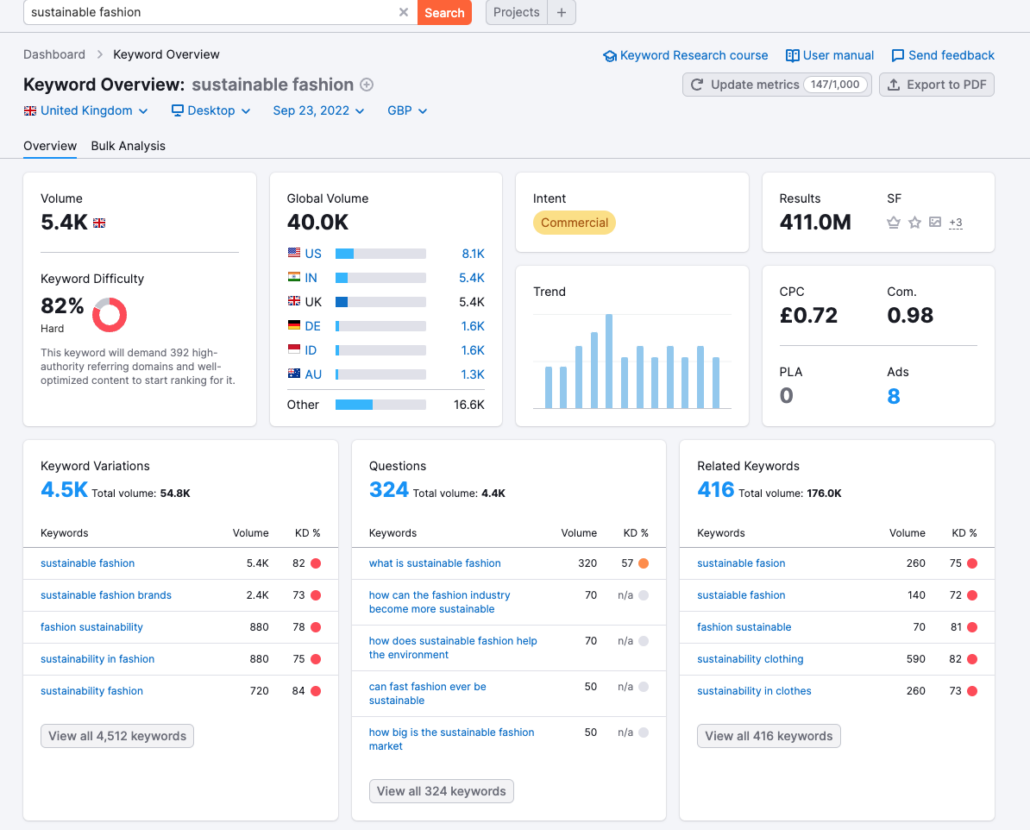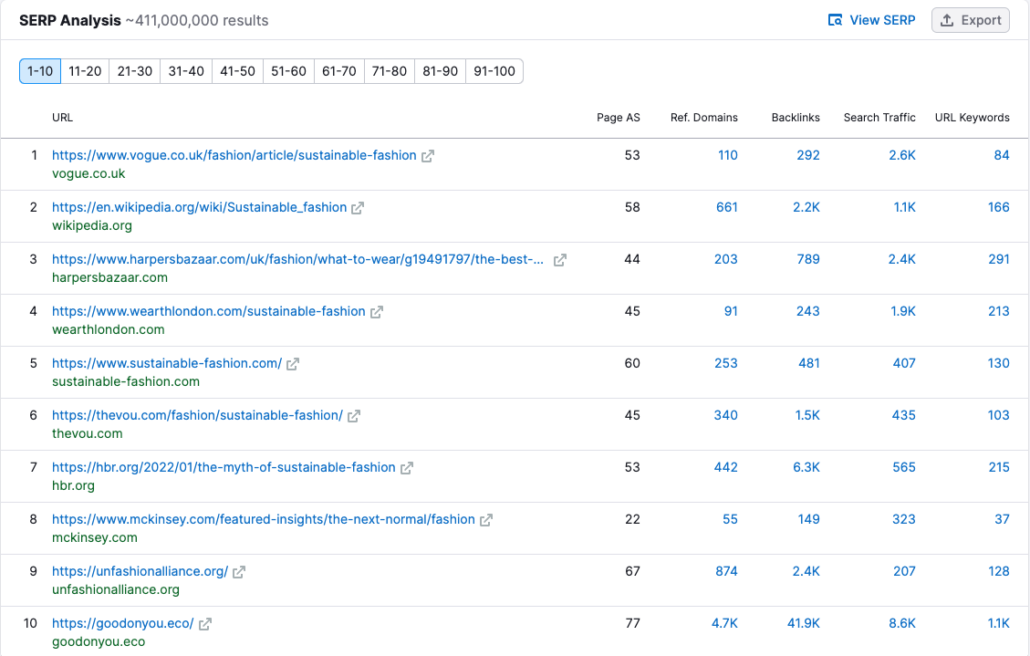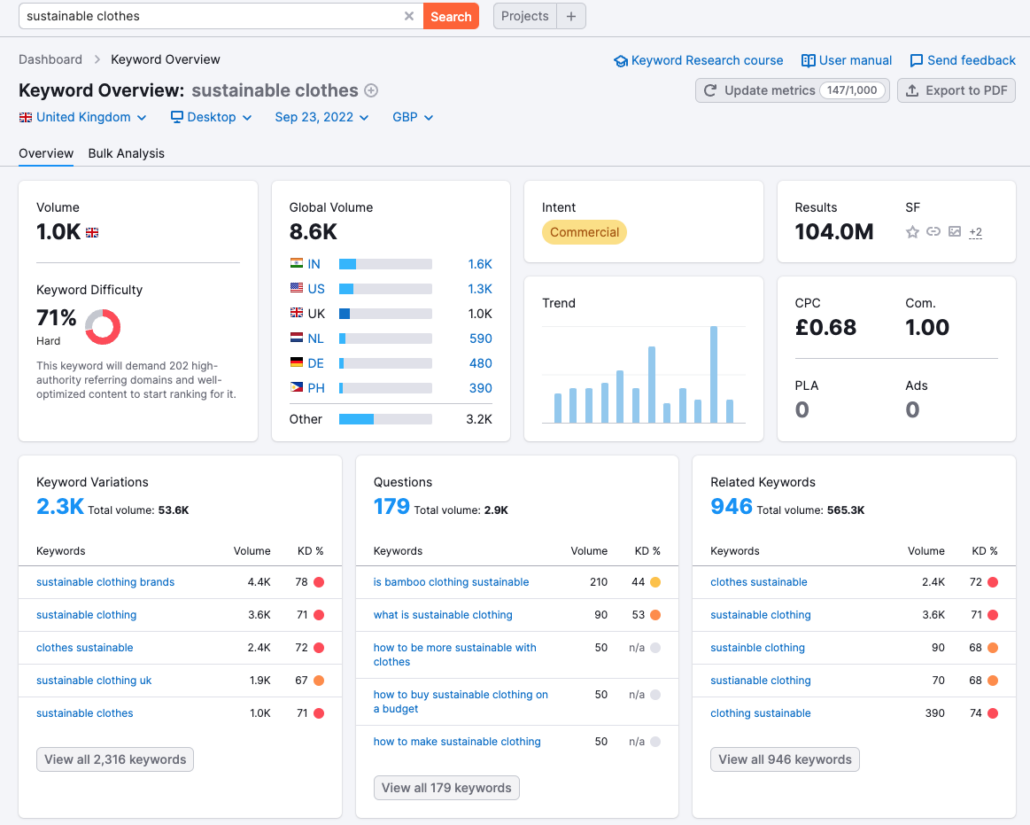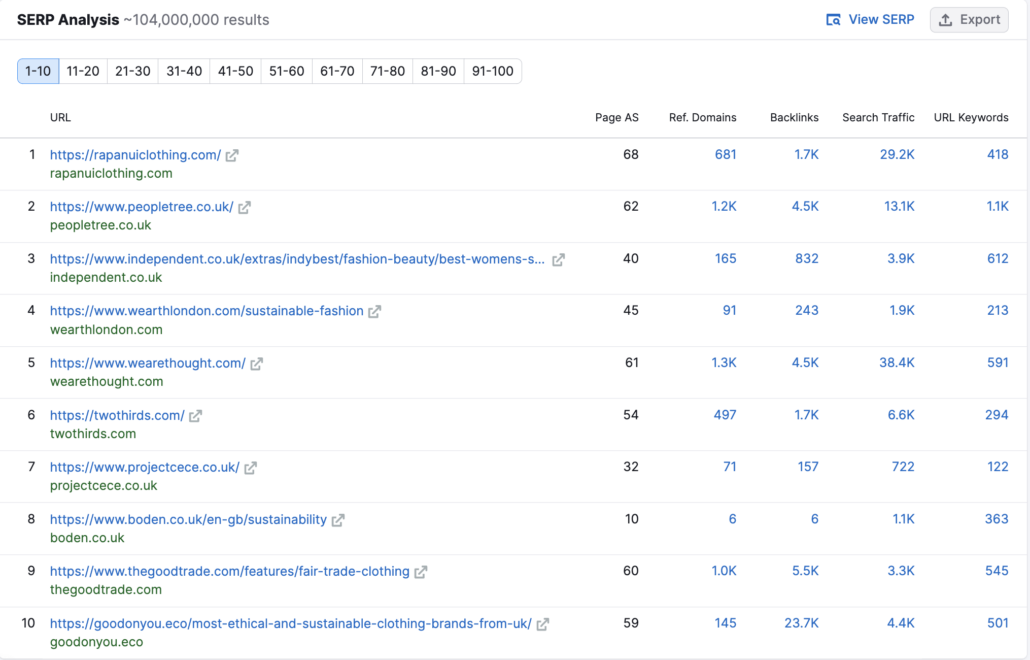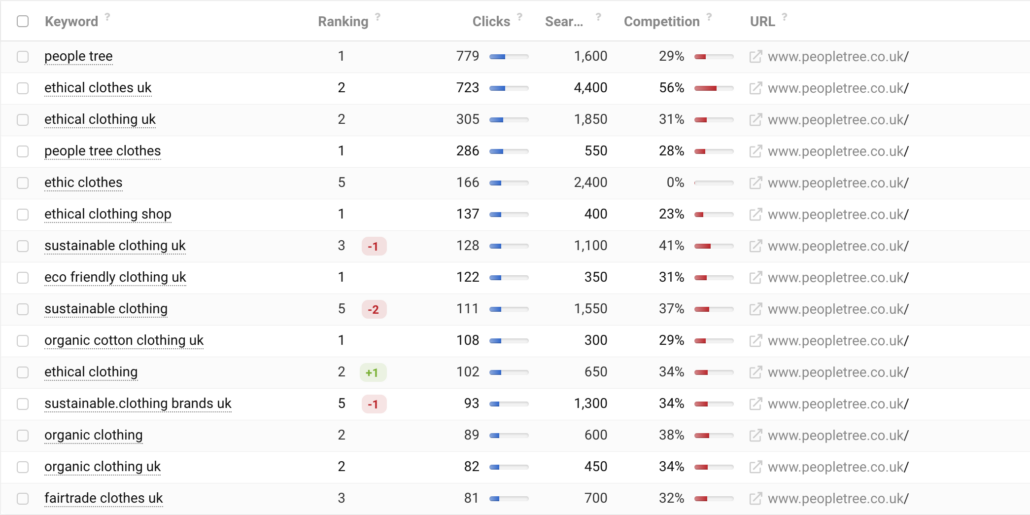A few weeks ago I was speaking with a pal who works in the eCommerce team at a well-known online and high street fashion retailer in the UK. They shared with me some of the steps the brand has taken to move towards being a more sustainable company.
Everything they shared were really admirable things, such as improvements to sourcing materials, production, shipping, etc. But despite this, they’re too nervous to incorporate any of these changes into their SEO content strategy.
You’re probably wondering why this is. And the answer is really to do with public relations (PR); they’re afraid of being called out for ‘greenwashing’.
Clientearth.org describes greenwashing as when “a company uses advertising and public messaging to appear more climate friendly and environmentally sustainable than it really is.”
A simple Google search will undoubtedly bring up fresh results for you at the time you read this blog post, but here’s a screengrab of what I can see today.
The term greenwashing isn’t a new one; it’s actually been used since environmentalist Jay Westerveld first coined its use in 1986. However, its usage has become more prominent in recent years as internet based advertising channels have grown.
In fact, this week Greenpeace and Harvard published a report named ‘Three shades of green(washing)’, which specifically looked at the social media activities of the largest car brands, airlines and oil and gas companies in Europe.
You may have also seen Patagonia’s strong statement and letter that said “Earth is now our only shareholder” after the company founder Yvon Chouinard and his family transferred the ownership of the brand to trusts set up to fight against the climate crisis.
This is a move that has brought the conversation surrounding sustainability and fashion retail back into the spotlight.
As sustainability is one of our own values at Re:signal, and many of the clients that we work with are in the fashion eCommerce space, I decided to see how sustainability was being represented specifically in the SERPs (Google UK).
Here are my findings…
Sustainability in the SERPs
Using Semrush, I looked up the keyword ‘sustainable fashion’ and discovered there was an average monthly search volume of 5,400 for this phrase in the UK. In the US this is higher at 8,100.
Despite the commercial intent of the keyword, many of the best ranking web pages were informational in nature, and with an 82% keyword difficulty, I can see why even deserving brands would avoid optimising their pages with this phase.
I then looked up ‘sustainable clothes’ which also has a commercial intent. The monthly search volume is lower at around 1,000 searches per month in the UK, but there are many more retailers listed this time, and a lower keyword difficulty (71%).
The brands ranking from position 1-20 in the SERPs included:
- Rapanui Clothing
- People Tree
- Wearth London
- TWOTHIRDS
- Thought Clothing UK
- Boden
- Project Cece
- ASOS
- Ethical Clothing
- This is Unfolded
Interestingly, none of these eCommerce retailers (or fashion aggregators) currently have B Corp status in the UK, although there are other accreditations that may be more suitable to some brands. Patagonia, as referenced above, is B Corp standard, something which more retailers may be forced to consider if they want to ride the sustainability movement.
Are there relevant on-site optimisations?
- Rapanui Clothing has set a home page title tag of ‘Rapanui | Sustainable Clothing’ so I think we can safely say that utilising this angle is part of their overall SEO and branding effort!
- People Tree have made more of an effort around fabrics, using descriptive product names with attributes like ‘100% organic certified cotton’ listed on the main category pages. However they do have a full about us section with subpages about fabrics, fair trade, environment and makers.
- Wearth London has a wider product range than clothing, but their clothing landing page has the title tag ‘Sustainable Fashion | Ethical & Eco Friendly UK Clothing Brands’. Interestingly, this is the only brand out of this group that appears in the top 10 results for ‘sustainable fashion’ too.
Are people searching for these brands with sustainable focused keywords?
Rapanui: Sistrix shows that the main driver of organic traffic is via the branded keyword ‘rapanui’ with around 4,000 clicks a month. ‘Men’s sustainable clothing’ is the largest driver of specific eco keywords with 308 clicks a month, followed by ‘sustainable clothing’ with 262 clicks.
People Tree: There is a much greater density of well ranking sustainable and ethical keywords ranking for People Tree. ‘People tree’ as the brand drives 779 clicks per month, only slightly beating ‘ethical clothes uk’ at 723 clicks. Here’s a screengrab of the rest of the terms so you can get a sense of how search engines view this site.
Wearth London: This is another brand that has a good spread of sustainable focused keywords, but they’re covering fashion and other product types too. This includes ‘eco-friendly water bottles’, ‘ethical jewellery uk’ and ‘eco friendly gifts’.
What should be ranking for sustainable fashion?
If I was to curate my own SERPs for these search terms (and similar), I’d want to be seeing much more in the way of second-hand clothing such as affordable vintage and charity shop listings. This is especially true during a cost of living crisis when spending less may become more important to consumers than the sustainability of their wardrobe.
Second hand clothing has long been popular on marketplaces such as eBay and Vinted, but there may be an opportunity for eco-conscious brands to do more in this space away from simply selling new products, even if they are made with improved materials and processes.
An example of this is Worn Wear, a subdomain of patagonia.com. It’s a full eCommerce shop where consumers can browse and purchase used clothes with all of the usual filters and facets. Snow & Alpine Pants in size small? Easy to find, lots of availability, and cheaper than buying them new.
Overall, I think there’s a lot of potential in this area for the SERPs to improve. At the moment, there’s a lot of information available from web based magazine and newspaper supplements, which themselves are a compilation of PR pieces anyway – I don’t think this is the sustainable solution that it may appear as.
Whilst there is a PR risk for brands who would like to promote their progress towards a more sustainable future (e.g. accusations of greenwashing), there is a benefit to consumers by providing more choice at different price points.
And considering we’re still in Second Hand September, Oxfam’s annual campaign to reduce the harmful effects of fashion, it’s a great time to review your strategy for the new year.
The next few months are renowned for their excess (I’m looking at you Black Friday and Christmas), but wouldn’t it be great to be able to make a meaningful change to buying habits by balancing both price and planet?


